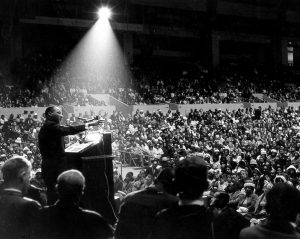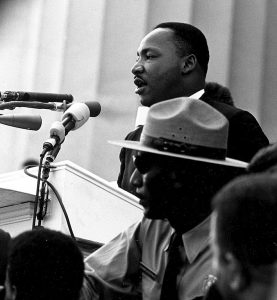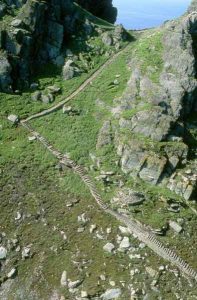In this sermon, the Rev. Dr. Arthur Suggs explored the major symbolism in the Rev. Dr. Martin Luther King, Jr.’s famous “I’ve Been to the Mountaintop” speech given the day before Dr. King was assassinated.

In that speech, the Rev. Dr. King told a story about how, several years before that, he’d gotten stabbed by “a demented black woman” while at a book-signing in New York City. The Rev. Dr. King said,
“The only question I heard from her was, ‘Are you Martin Luther King?’ And I was looking down writing, and I said, Yes. And the next minute I felt something beating on my chest. Before I knew it, I had been stabbed by this demented woman. I was rushed to Harlem Hospital.”
“It came out in The New York Times the next morning, [and the way in which they worded it was that,] if I had merely sneezed, I would have died. Well, about four days later . . . . they allowed me to read some of the mail [which included the letters he received were those from the President, the Vice President, and the Governor of New York, but there was one from a young girl that he said he would never forget.] It said simply:
Dear Dr. King,
I’m so happy you didn’t sneeze.
I am a ninth-grade student at the White Plains High School. While it should not matter, I would like to mention that I am a white girl. I read in the paper of your misfortune, and of your suffering. I read that if you had sneezed, you would have died. And I’m simply writing you to say that I’m so happy that you didn’t sneeze.”

The Rev. Dr. King noted that he, too, was glad he hadn’t sneezed, because if he had sneezed, given the proximity of the knife wound to his aorta, he wouldn’t have been alive to witness a few key events:
“I wouldn’t have been around here in 1960, when students all over the South started sitting-in at lunch counters. And I knew that as they were sitting-in they were really standing up for the best in the American dream.”
“If I had sneezed, I wouldn’t have been around here in 1961, when we decided to take a ride for freedom and ended segregation in interstate travel.”
“If I had sneezed, I wouldn’t have been here in 1963, when the black people of Birmingham, Alabama, aroused the conscience of this nation and brought into being the Civil Rights Bill.”
“If I had sneezed, I wouldn’t have been down in Selma, Alabama, to help lead the five-day march in 1965 from Selma to the state capital in Montgomery, across the Edmund Pettus Bridge.”

“If I had sneezed, I wouldn’t have been in Memphis, Tennessee, to see a community rally around those brothers and sisters who are suffering.”
“And some began to say the threats, or talk about the threats that were out. What would happen to me from some of our sick white brothers?”
“Well, I don’t know what will happen now. We’ve got some difficult days ahead. But it really doesn’t matter to me now, because I’ve been to the mountaintop.”
“And I don’t mind.”
The Rev. Dr. Suggs in his post-Epiphany sermon, goes on to explore the major symbols in religious and spiritual traditions — the pilgrimage, the often arduous climb to the mountaintop being symbolic of the spiritual journey itself.
Rev. Suggs shared,

“Mountains are more than just their primal metaphor for our spiritual quest, more than just a reminder of that beyond, especially when we are so totally engrossed in our world. The mountain also beckons us, encourages us, calls us, draws us toward the higher plane of the spirit.”
“Trees remind us of our nature, that we are both flesh and spirit, both earthly and heavenly. Mountains call us higher. The view of creation gets better the higher we go.”
Download and read the full Baptized by Beauty (I Have Been to the Mountaintop) sermon here.
